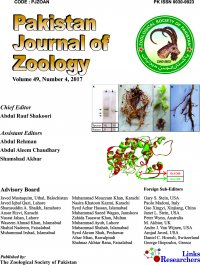Effect of Water of Tilapia Pond on Reproduction of Meloidogyne incognita and Growth of Eggplant in Relation to Soil Type
Effect of Water of Tilapia Pond on Reproduction of Meloidogyne incognita and Growth of Eggplant in Relation to Soil Type
Hosny Kesba1, Ashraf Suloma2, Samy Sayed3*, Abdullah Abdel-Rahman1 and Shaimaa Diab1
ABSTRACT
Plant-parasitic nematodes particularly the genus Meloidogyne are a primary limiting factor in the production of many plants and is a major problem in organic systems. This study was carried out to examine the influence of irrigation with different effluent water sources, including semi-intensive tilapia pond (STP), intensive tilapia biofloc (ITB) systems, and well water (WW), on the reproduction of Meloidogyne incognita infecting eggplants7 or 45 days after planting in sandy loam or sandy soils. Each irrigation source was applied daily at 150 mL/pot. The STP source was more suppressive to nematode development than ITB irrigation source in the two inoculation times of treatments either in sandy soil or sandy loam soil. Also, the produced eggs were highly influenced by the STP source achieving half of the produced eggs in the ITB after 45 days of inoculation time. The plant growth was enhanced. The efficiency percentage (%) of STP in both soil types was more than ITB. The growth parameters of the plants (length and fresh and dry weights) in both soil types also significantly increased when compared with WW. The STB and ITB irrigation sources improved the plant content regarding the total protein, total amino acids, and total carbohydrates in both tested soil types. These results suggest that aquaculture effluents from tilapia production could be utilized to manage M. incognita in different soil types.
To share on other social networks, click on any share button. What are these?









